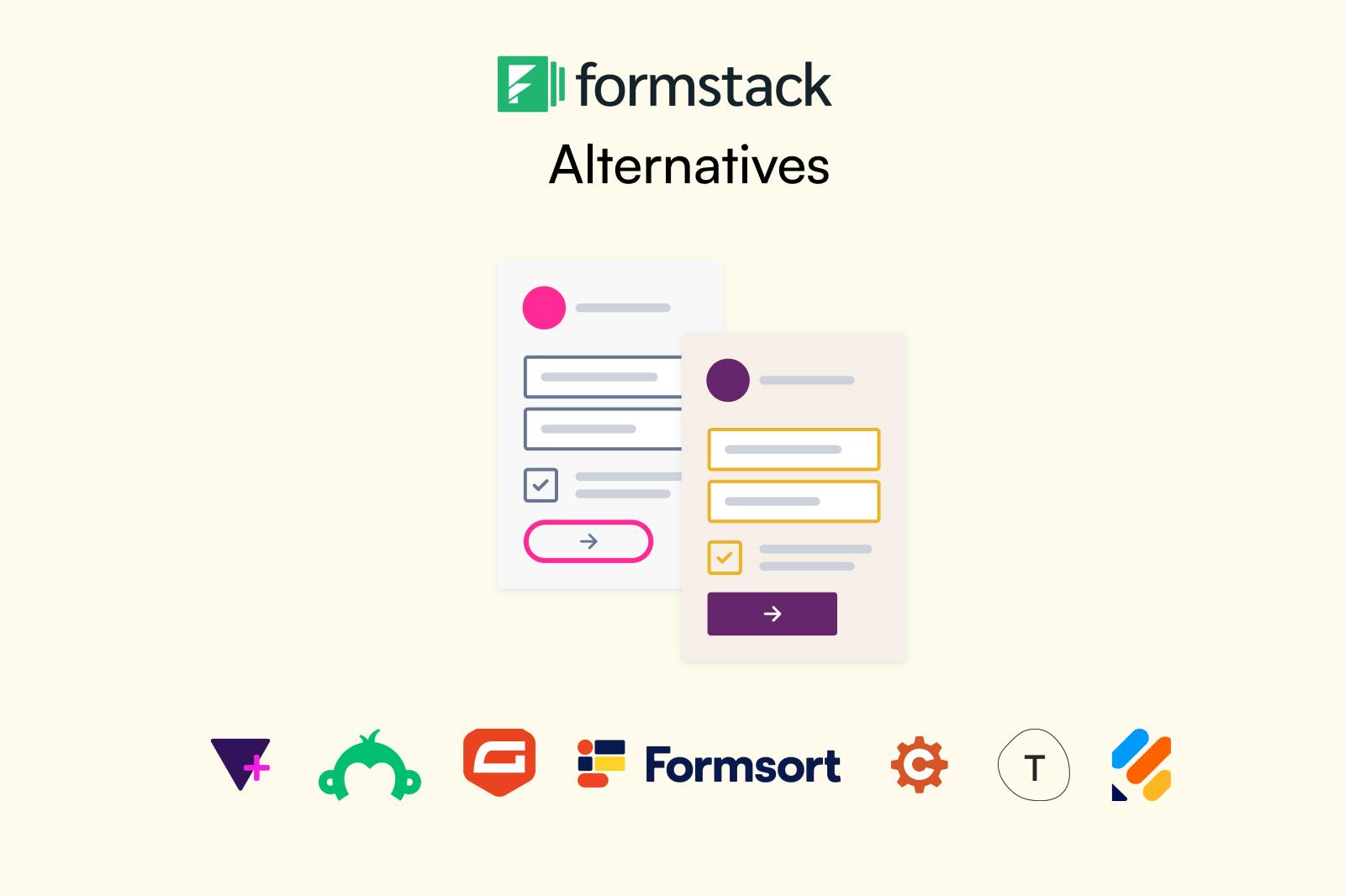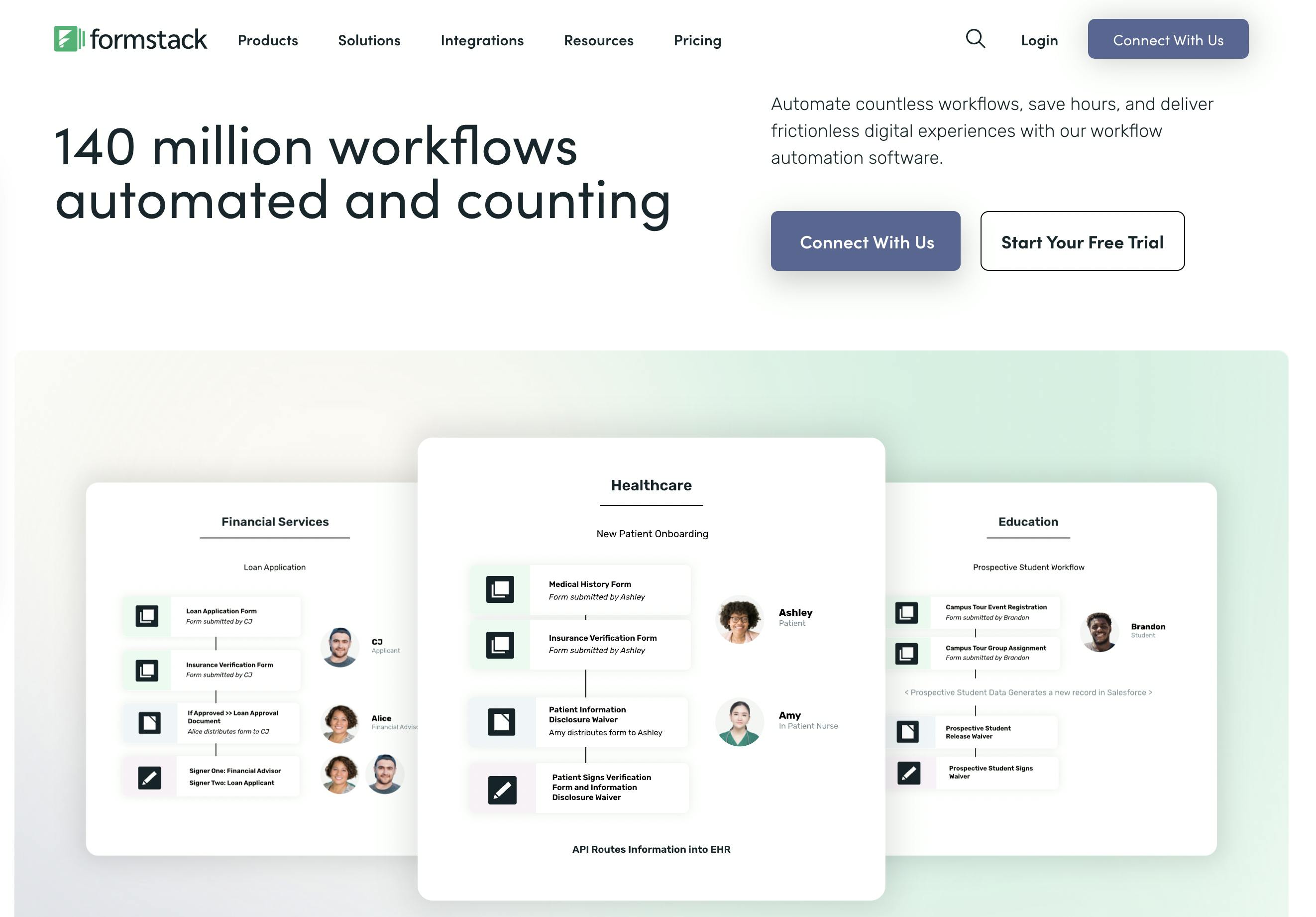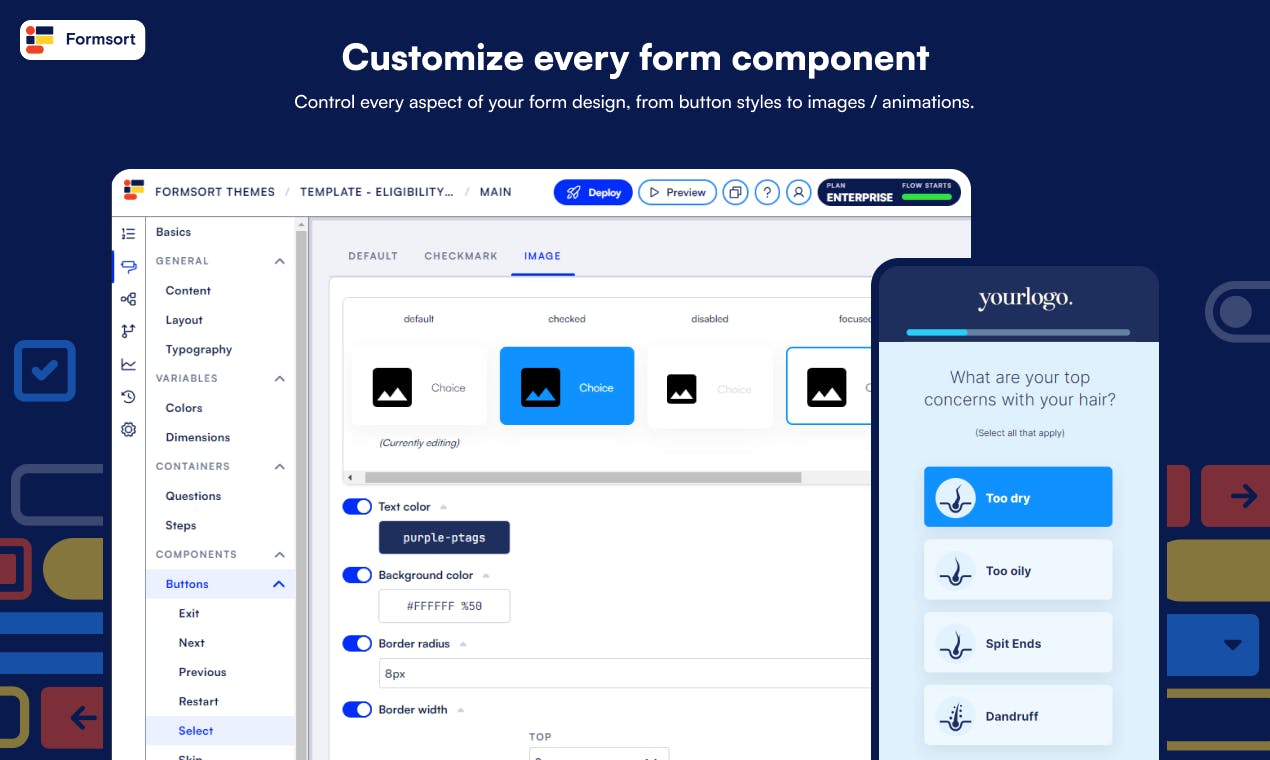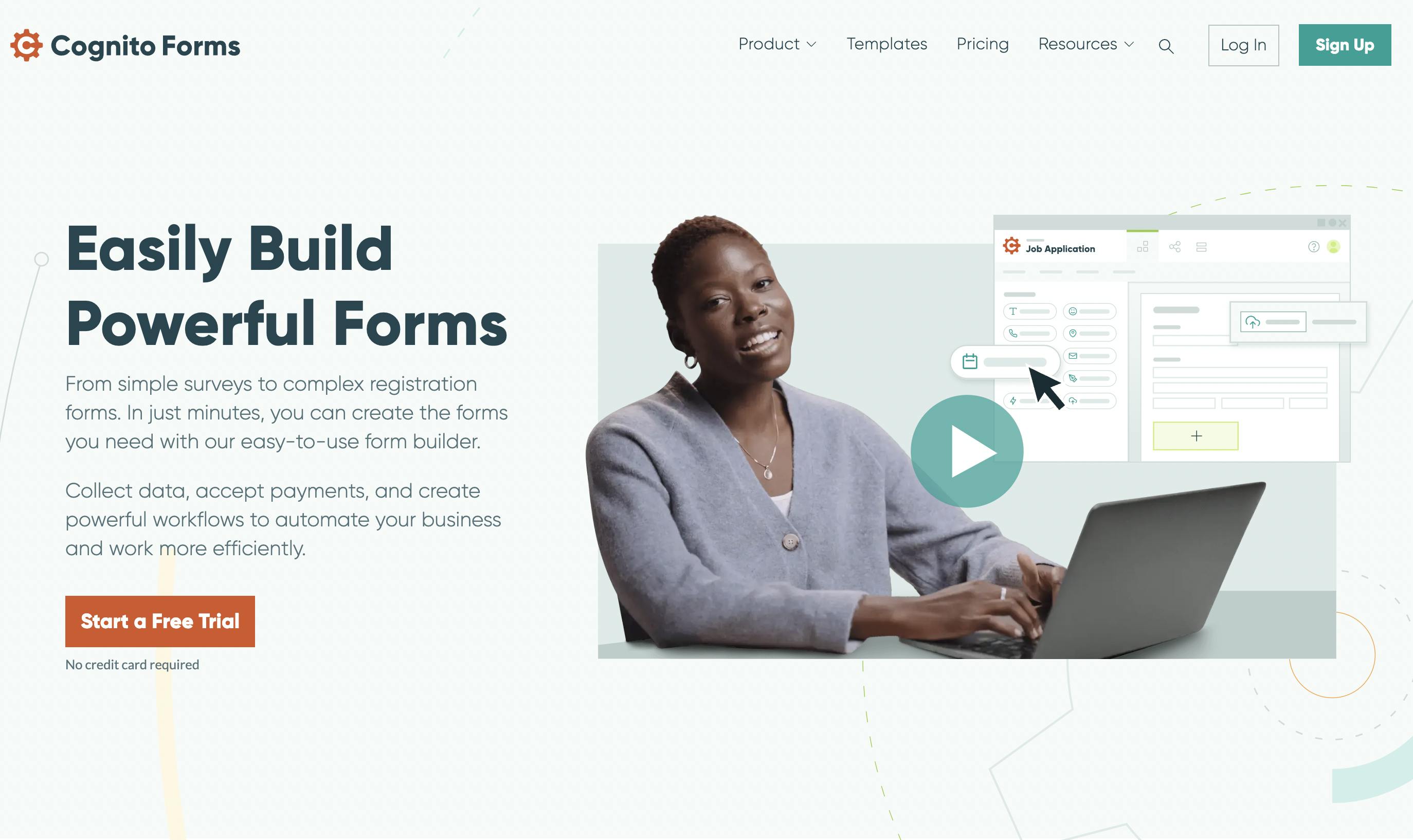7 Best Formstack alternatives

Discover the form builders leading innovation in data collection
Formstack is an established form builder that provides a range of no-code solutions for businesses, including online forms, document generation, and e-signatures. Yet, some businesses might look for Formstack alternatives, platforms that can meet their current demands as well as adapt to future growth.
With the emergence of form builders offering highly specialized tools and driving innovation in distinct directions, exploring alternatives to Formstack may not be about substitution, but for optimization. It’s about finding the best fit for your company’s unique needs based on the features that can add the most value to your data collection experience.
In this article, we’ll discuss the reasons why you might consider switching from Formstack, discuss several alternatives, and explore the unique features that set Formsort apart as a form builder.
What is Formstack?
Formstack is a form builder, known for providing a versatile array of solutions, including lead generation, vendor transaction, customer feedback and other forms. With a suite of features and a history of reliability, Formstack offers a comprehensive platform designed to meet diverse business needs. Relatively easy to learn and flexible for companies of various sizes, Formstack is a trusted form-builder across many industries.

Why consider alternatives to Formstack
Although Formstack is a reliable solution for many businesses, it does pose some challenges that prompt users to seek alternatives. Issues such as the inability to download submitted files in bulk or apply custom themes pose usability challenges.
Plus, Formstack's workflow approval process, performance issues with large forms and integrations, and limited design capabilities further compound user frustrations. These concerns can lead users to explore alternative platforms that better align with their needs and expectations.
How to choose the form builder for you
It might be overwhelming to sift through all the Formstack alternatives form builders out there to try and find the best fit for your business’s unique needs. Focusing on the most critical factors can help you identify a few great candidates.
In assessing potential form builders, consider the data management, customization and scalability options they offer, such as:
- User-friendly interface - Look for a form builder with an intuitive design, ensuring ease of use for both beginners and experienced users.
- Mobile responsiveness - Ensure that the form builder creates mobile-friendly forms, as a significant portion of users access forms via mobile devices.
- Customization options - The chosen form builder should allow you to tailor forms so you can create personalized form journeys that cater to unique user experiences and preferences.
- Styling - From customizable color schemes and fonts to the incorporation of logos and branding elements, the form builder should provide comprehensive styling features so your form is an extension of your brand.
- Integration capabilities - Check the integration options with other tools and platforms (e.g., CRM, data stores) to streamline your workflow.
- Advanced form features - Evaluate the availability of advanced features (e.g., conditional logic, custom questions, custom validation, APIs) to accommodate diverse data collection needs.
- Cost and scalability - Consider your budget and the scalability of the form builder. Choose a solution that aligns with your current needs and provides room for growth.
- Customer support - Assess the availability and responsiveness of customer support. A reliable support system ensures prompt assistance in case of issues.
- Compliance and regulations - Verify that the form builder complies with relevant data protection regulations, especially if you handle sensitive information like healthcare data (HIPAA, SOC2).
Process
Streamline your decision-making by following these steps:
- Define your needs: Outline the type of data you need to collect, list out any specific features or requirements you need.
- Trial period or a free plan to start with: Take advantage of free trials or demo versions to explore the features and functionalities of different form builders before committing.
- Check integration options: Confirm that the form builder integrates seamlessly with your existing tools and systems to avoid disruptions in your workflow.
- Assess support and team responsiveness - Evaluate the accessibility and responsiveness of customer support channels, ensuring you have reliable assistance when needed.
Top 7 Formstack alternatives
1. Formsort
Formsort is emerging as a noteworthy choice for a form builder, distinguishing itself with features designed to create highly personalized user experiences. Its platform allows for the incorporation of dynamic content, calculated variables, custom questions, and advanced branching logic, enabling the creation of forms that truly resonate with your audience. Designed with versatility in mind, Formsort supports both template-based and custom form creations that are not only mobile-responsive but also customizable to reflect your brand's identity.
If you’re a healthcare, fintech or other business handling sensitive information, Formsort is a reliable choice. It’s HIPAA-compliant, SOC-2 certified, and will sign a BAA upon request. Formsort isn't just secure; it's also designed to help your business grow. It lets you quickly make changes and test different versions of your forms to see what works best. With the admin API, you can automate your testing and deployment processes, audit variant records, and retrieve a list of your forms directly in your application.
Even if users don’t submit their forms, Formsort's partial data capture gives you insights to help encourage them to finish. And if you ever need help, Formsort’s comprehensive customer support is there to guide you through any questions you might have.
Choosing Formsort means opting for a form builder that cares about security, customization, and your business's growth. It’s a straightforward way to create engaging forms that meet your needs and keep your data safe.
✅ Free plan
✅ Flexible layout
✅ Calculator
✅ Templates available
✅ Advanced conditional logic
✅ Custom validators
✅ Field prefill
✅ Partial submissions
✅ File uploads
✅ API variables
✅ A/B testing
❌ New users might experience a learning curve with the advanced features in the studio but customer support will help you with any questions

2. Typeform
With Typeform’s drag-and-drop interface and conversational approach to form-building, you can quickly and easily create one-off interactive forms, quizzes and surveys. It offers a range of question types, basic conditional logic, some design customization, and data processing integrations, making Typeform a good solution for small businesses.
Typeform can be limiting for larger organizations with more advanced data collection or design customization needs. Some users may also find the analytics and reporting features to be less robust than they would prefer.
✅ Free plan
✅ Basic calculator
✅ Conditional logic
✅ Accepts payments
✅ File uploads
❌ Limited customization means you can tell easily recognize a Typeform form
❌ Variant testing
3. Tally forms
Offering a Notion-like experience within form building and a generous free plan, Tally Forms is ideal for creators and freelancers. With its user-friendly interface and no-code simplicity, users can whip up simple forms without hassle. It also provides basic conditional logic, form customization, and integration options with commonly-used tools. The platform offers unlimited forms, questions, and submissions at no cost, making it suitable for users prioritizing efficiency and affordability.
Tally Forms’ feature set may not be as extensive as some competitors, lacking advanced functionalities such as complex logic, advanced analytics, custom CSS and advanced integrations with third-party applications. However, users can seamlessly embed forms, store data securely, and even process payments using Tally forms, making it a practical solution for simple data collection needs.
✅ Calculator
✅ Templates available
✅ Conditional logic
✅ FIeld prefill
✅ File uploads up to 10MB
✅ reCAPTCHA
❌ Slow performance
❌ Team collaboration on shared workspace
4. Survey Monkey
SurveyMonkey is the industry standard when it comes to questionnaires. Offering a wide range of survey templates and question types, it’s a great data collection tool for various research purposes. It also offers customization options to create surveys that match the user's brand identity. SurveyMonkey provides powerful analytics tools that allow users to analyze survey responses in real-time and gain valuable insights.
Some users may find the pricing plans to be relatively expensive compared to other survey platforms, especially if they need advanced features or larger survey volumes.
✅ Calculator
✅ Templates available
✅ Conditional logic
✅ Accepts payments
✅ File uploads
✅ Email notifications
✅ Field prefill
❌ Few customization and personalization options
5. Jotform
For those seeking straightforward and cost-effective form-building solutions, Jotform stands out with its extensive library of customizable templates. It’s reliable, offers great functionality, and requires no coding knowledge. Plus, Jotform’s workflow automation will let you integrate multiple forms to streamline your operations. You’ll also get basic logic capabilities and limited design customization.
Jotform’s functionalities include passing data via URL parameters, setting up email notifications for form submissions, and saving returning responder data–although you won’t have flexibility when it comes to choosing the save points. The platform can have trouble handling frequent changes to your form.
✅ Free plan
✅ Calculator
✅ Templates available
✅ Conditional logic
✅ Accepts payments
✅ File uploads
✅ API variables
✅ A/B testing
❌ Limited data analysis options
❌ Limited customization
6. Gravity forms
Gravity Forms is a robust WordPress plugin with aligned features. From simple contact forms to complex multi-page surveys and payment forms, Gravity Forms provides a comprehensive set of solutions for WordPress users, including conditional logic, file uploads and seamless connections with popular third-party tools and services. It even has an interface right within the WordPress dashboard that makes it convenient for WordPress users to create and manage forms directly from their website.
While the plugin itself is relatively affordable, users may need to purchase add-ons for certain advanced features, which can increase the overall cost. Additionally, Gravity Forms may not be suitable for users with high-traffic websites or large-scale form requirements, as it may impact website performance and require additional resources.
✅ Calculator
✅ Templates available
✅ Accepts payments
✅ File uploads
✅ Email notifications
✅ Field prefill
❌ Lacks advanced conditional logic and convenient CSS customization
❌ A/B testing
7. Cognito Forms
Integrating forms within a workflow automation system, Cognito Forms is an affordable solution for internal data management. Cognito Forms offers a range of customizable templates and form fields, from contact forms to surveys and event registrations.It also provides advanced features such as conditional logic, calculations, and file uploads. Seamless integrations with popular tools such as Microsoft Excel, Google Sheets, and Zapier enhance its versatility.
Navigating the Cognito Forms studio may pose challenges, with setup and maintenance requiring significant time. While it lacks certain popular features like A/B testing, advanced analytics and customizable loading animations and sliders, it’s still a dependable choice for basic form-building and workflow automation needs.
✅ Free plan
✅ Calculator
✅ Conditional logic
✅ Accepts payments
✅ File uploads
✅ Email notifications
✅ Field prefill
❌ Forms aren’t static
❌ Limited documentation

Easily switch from Formstack to Formsort
Forms are effective tools for gathering essential data and cultivating connections. With so many Formstack alternatives out there, form builders that are offering great solutions and developing new features, you want to look for a solution that aligns with your business’s needs, such as ease-of-use, advanced logic, design customization, and data security. With Formsort, you can create sleek, dynamic forms that drive results across industries. Start a conversation with leads, support client onboarding, and optimize operations with dynamic form solutions.